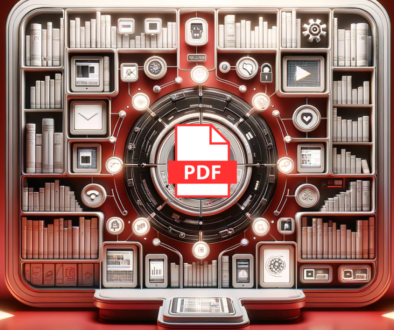3 PDF Libraries – Hypothetical Case Studies on Using Resource Center
Here are 3 hypothetical examples of using Resource Center to build PDF suites for professional services:
Marketing Agency
A marketing agency could leverage Resource Center to develop a robust library of PDF assets organized by service lines like brand strategy, content marketing, social media marketing, SEM/PPC campaigns, marketing analytics, and more.
Specific types of documents like ebooks, whitepapers, case studies, creative brief templates, media kit templates, analytics frameworks, and sample deliverables can be uploaded into relevant categories and subcategories.
For example, the Content Marketing folder may contain guides on optimizing blogging, whitepapers on thought leadership strategies, case studies demonstrating successful content campaigns, and templates for creating different types of digital content.
The Brand Strategy section could feature brand guideline templates, brand positioning frameworks, audit checklists, competitive analysis frameworks, and case studies on brand development.
Including the javascript search widget on the agency’s website services pages allows visitors to explore and self-educate on marketing topics easily. Providing open access to detailed examples of deliverables and templates builds trust by showcasing their expertise.
Visitors can search for and find the resources needed to make informed buying decisions or get up to speed on marketing areas relevant to their business. The agency could gate content with an email requirement to ensure they obtain clients.
This wealth of organized marketing knowledge positions the agency as an authority in the field while also generating leads by giving away free, valuable educational content. vThe comprehensive PDF library can nurture leads across every stage of the buyer’s journey – from awareness and education to consideration and decision-making.
Customers can even continue referencing the suite of PDFs for ongoing education and best practices after hiring the agency for continual value.
The searchable online resource center becomes an invaluable sales tool by both marketing the agency’s expertise and providing helpful tools to guide customers in evaluating, selecting and partnering with them.
Accounting Firm
An accounting firm could leverage Resource Center to organize a wealth of PDF assets for financial planning, tax preparation, auditing, bookkeeping, payroll, and other services.
Specific accounting resources like tax planning guides, financial projection templates, bookkeeping workflows, payroll checklists, audit frameworks, and sample reports can be uploaded into relevant categories and sub-folders. This could be built into their website with client logins to keep the information secure.
For example, the tax preparation folder may contain primers on new tax codes, calculators for projections, and checklists for compiling paperwork.
The financial planning section could provide retirement planning templates, budget spreadsheets, guides on business financing, and presentations on investing.
The bookkeeping area may include accounts payable/receivable workflows, invoicing templates, reconciliation tools, and quickbooks guides.
By embedding the PDF search widget on their services page, authorized visitors can easily find whatever accounting resources they need to make informed financial decisions.
This accessible database of accounting knowledge centers the firm as an authority in the field while providing value to prospects upfront. It will also save them valuable hours otherwise spent sending PDF emails back and forth. Allowing potential clients to self-serve specialized tools and educational content helps nurture them through the buyer’s journey, onboarding and as an active client.
Legal Services
A law firm could use Resource Center to build a suite of PDFs organized by practice areas like Business Law, Real Estate, Family Law, Employment Law, Litigation, and more. Relevant legal guides, court forms, document templates, checklists, and primers can be uploaded into each practice area folder and subcategories.
For example, the Employment Law section may contain guides on HR compliance, sexual harassment policies, termination procedures, plus templates for contracts and employee handbooks.
The Family Law area could provide primers on divorce, alimony, child custody, and estate planning, alongside downloadable workflows, trackers, and worksheet templates to support clients.
The Litigation folder may contain summaries of statutes of limitations, court calendars, litigation timelines/checklists, and sample complaint templates.
Embedding the PDF search widget on the law firm’s website allows visitors to easily educate themselves and find answers on common legal questions with the appropriate caveats on legal advice. It is suggested to keep many of these documents for clients only.
The searchable database of legal knowledge helps establish expertise in the firm’s different practice areas. Offering free access to useful templates and primers also provides value upfront while gently marketing their services. Allowing potential clients to sample document templates and workflows demonstrates the quality that can be expected while building trust and credibility for the firm.
Beyond marketing, the searchable PDF library adds value for current clients seeking ongoing education or additional legal support materials.
Whether for positioning expertise, generating leads, or serving active clients, the organized legal PDF suite becomes an invaluable asset and differentiator for the law firm.




